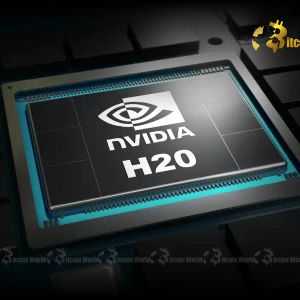Nvidia H20 Chip: Strategic Reversal Unveils Rare Earth Elements’ Crucial Role in US China Trade
6 min read
BitcoinWorld Nvidia H20 Chip: Strategic Reversal Unveils Rare Earth Elements’ Crucial Role in US China Trade In the dynamic world of technology and global commerce, where every byte of data and every microchip holds immense value, shifts in policy can send ripples across markets, including the cryptocurrency landscape. For those deeply invested in the digital economy, understanding the foundational technologies that power it is paramount. The recent announcement regarding the resumption of Nvidia H20 chip sales to China is one such development, revealing a complex interplay of geopolitical strategy, economic dependencies, and the vital role of resources like Rare Earth Elements . This move by Nvidia, a titan in the semiconductor and AI space, is not just about silicon; it’s a window into the delicate balance of power shaping global tech, which ultimately impacts the infrastructure and innovation within the crypto ecosystem. Nvidia H20 Chip Sales: A Pivotal Policy Reversal Just months after signaling a potential withdrawal from the Chinese market, a significant shift has occurred. Nvidia, a leading designer of graphics processing units (GPUs) essential for everything from gaming to complex AI models, has filed an application to resume sales of its H20 AI chip to China. This reversal is a direct response to ongoing high-stakes trade discussions between the United States and China. The H20 is a specially designed, toned-down version of Nvidia’s more advanced AI chips, crafted to comply with U.S. export restrictions while still meeting China’s considerable demand for AI infrastructure. This strategic pivot isn’t isolated. AMD, another major player in the semiconductor industry, is reportedly planning to restart sales of its MI308 AI chip in China, mirroring Nvidia’s approach. These actions highlight a calculated effort by U.S. chipmakers to navigate stringent export controls while retaining access to one of the world’s largest and most crucial technology markets. The balancing act involves satisfying national security concerns without completely ceding market share to competitors or stifling innovation. Rare Earth Elements: The Unseen Leverage in Global Trade The core of this complex trade negotiation lies with Rare Earth Elements (REEs). These seventeen metallic elements, including lanthanum and cerium, are indispensable components in virtually all modern high-tech products. From the rechargeable batteries powering electric vehicles and smartphones to advanced defense systems and, crucially, the manufacturing of sophisticated semiconductors, REEs are the bedrock of the digital age. What makes them a critical point of contention is China’s overwhelming dominance in their mining and processing. China controls a vast majority of the global supply, giving it significant geopolitical leverage. U.S. Commerce Secretary Howard Lutnick explicitly linked Nvidia’s decision to ongoing trade discussions concerning these vital elements. This suggests a potential quid pro quo: China’s continued access to certain AI chips in exchange for more favorable terms or assured supply of rare earths for U.S. industries. This dependency underscores the vulnerability of global supply chains and the strategic importance of these often-overlooked materials in the broader US China trade relationship. Navigating AI Chip Exports and Geopolitical Tensions The landscape of AI chip exports is fraught with tension and evolving regulations. While the U.S. aims to restrict China’s access to cutting-edge AI technology for national security reasons, the economic implications of a complete technological decoupling are immense. Secretary Lutnick attempted to alleviate concerns by stating that China would only receive Nvidia’s “fourth best” chip, emphasizing that top-tier technology remains restricted. “We don’t sell them our best stuff, not our second best stuff, not even our third best,” Lutnick asserted, seeking to frame the decision as a controlled concession. However, not everyone shares this optimistic view. Congressman Raja Krishnamoorthi voiced strong opposition, stating that such a decision “would not only hand our foreign adversaries our most advanced technologies, but is also dangerously inconsistent with this administration’s previously-stated position on export controls for China.” This sentiment highlights the ongoing debate within U.S. policy circles regarding the optimal balance between economic engagement and national security. The U.S. government is still refining its AI chip export rules, with the Trump administration having rescinded the Biden administration’s AI Diffusion Rule in May, leaving an uncertain regulatory environment. Furthermore, concerns about smuggling have led to rumors of considering further restrictions on AI chip exports to countries like Thailand and Malaysia, with Malaysia already implementing trade permits on U.S.-made AI chips recently. The Broader Impact on the Semiconductor Industry The implications of these trade policies extend far beyond individual companies, significantly shaping the entire semiconductor industry . This sector, the backbone of modern technology, thrives on global collaboration and open markets. Restrictive trade policies and export controls introduce considerable uncertainty, impacting research and development investments, manufacturing strategies, and supply chain resilience. Companies like Nvidia and AMD are forced to adapt their product lines and market strategies to comply with ever-changing geopolitical directives, often leading to less efficient resource allocation. The constant back-and-forth in regulations also creates a complex operational environment, making long-term planning challenging. While the U.S. seeks to maintain its technological lead, the risk remains that overly stringent controls could inadvertently accelerate China’s efforts to develop its indigenous semiconductor capabilities, potentially reducing its long-term reliance on foreign technology. This dynamic underscores the delicate balance between fostering domestic innovation and navigating the realities of a deeply interconnected global economy. US China Trade: A Complex Dance of Dependencies The evolving relationship between the US China trade powers is a defining feature of the 21st century. It’s a complex dance of economic interdependence intertwined with strategic competition. While both nations benefit immensely from trade, the rise of critical technologies like AI and the control of strategic resources like Rare Earth Elements have transformed the relationship into a high-stakes geopolitical contest. The current situation with Nvidia’s chips and REEs exemplifies this dynamic, where economic leverage is used as a tool in broader strategic objectives. This intricate relationship is not just about chips and minerals; it’s about global leadership in technology, economic influence, and national security. The decisions made today regarding trade and technology transfer will have profound implications for the future global order, influencing everything from supply chain stability to the pace of technological advancement worldwide. Bitcoin World Disrupt 2025: Insights from the Tech Frontier For those tracking the pulse of innovation and investment, events like Bitcoin World Disrupt 2025 offer invaluable insights into the trends shaping the future of technology and finance. With heavyweights from Netflix, ElevenLabs, Wayve, and Sequoia Capital joining the agenda, the event promises to deliver critical perspectives that fuel startup growth and sharpen industry understanding. As the digital economy continues to evolve, influenced by geopolitical shifts in the semiconductor industry and AI, platforms like Disrupt provide a crucial forum for learning from top voices in tech and venture capital. This 20th-anniversary event, held in San Francisco from October 27-29, 2025, is an opportunity to connect with over 10,000 tech and VC leaders, amplify brand reach, and spark real connections that drive innovation. Conclusion: Navigating a New Era of Tech Geopolitics Nvidia’s decision to resume H20 chip sales to China, intricately linked to the trade of Rare Earth Elements , marks a significant moment in the ongoing saga of U.S.-China tech relations. It underscores the profound interdependence of global supply chains and the strategic importance of both advanced technologies and critical raw materials. While the U.S. aims to curb China’s access to its most advanced AI capabilities, the economic imperative to engage with a vast market remains strong. This delicate balance will continue to define the future of the semiconductor industry , impacting innovation, market access, and ultimately, the global technological landscape. As we move forward, the interplay between national security, economic prosperity, and technological leadership will undoubtedly remain at the forefront of international policy discussions, with ripple effects across all sectors, including the rapidly evolving world of decentralized finance and cryptocurrencies. To learn more about the latest AI market trends, explore our article on key developments shaping AI features and institutional adoption. This post Nvidia H20 Chip: Strategic Reversal Unveils Rare Earth Elements’ Crucial Role in US China Trade first appeared on BitcoinWorld and is written by Editorial Team

Source: Bitcoin World



